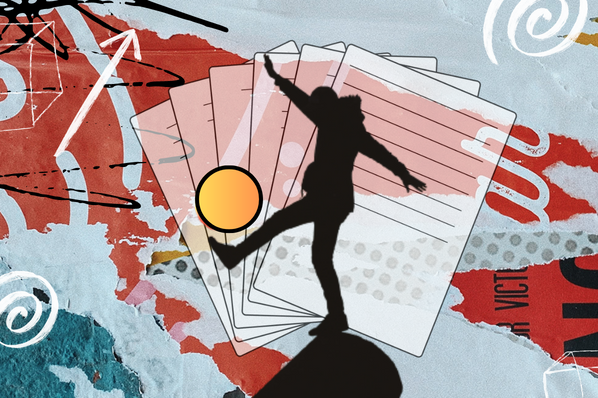Don't talk to me before I've had my coffee. It's a common workplace utterance, but it's representative of a real issue: Some of us struggle through a daze every morning before feeling sharp, productive, or creative.
.png?width=524&height=393&name=brain%20(1).png)
But we might be giving caffeine too much credit. There's more at play when it comes to our productivity cycles throughout the day, and much of it is out of our control.
In order to optimize your energy and boost your productivity, you first need to understand your individual biology to harness its power.
Studying the biology behind human performance is Dr. Sahar Yousef, a cognitive neuroscientist and lecturer at UC Berkeley. Here, she shares her tips for becoming a more focused, productive, awake version of yourself:
1. Identify Your Chronotype
The 2017 Nobel Prize in Physiology or Medicine went to three scientists who studied the molecular mechanisms that control circadian rhythms. The research showed that mismatches between external environments and one's internal biological clock can have adverse effects on well-being and even increase one's risk of disease.
And we don't all function on the same biological clock. There are three chronotypes: AM-shifted (20%-25% of the population), Bi-phasic (50%+ of the population), and PM-shifted (15%-20% of the population).
Individuals with an AM-shifted chronotype are early birds who thrive in the morning (and wake up early regardless of how much or how little sleep they get). PM-shifted individuals are the night owls whose energy peaks in the evening and who might find it challenging to accomplish meaningful work in the morning and early afternoons.
The Bi-phasic chronotype, while not as widely talked about as the other types, is actually the most common and represents having two energy peaks throughout the day a slow start in the morning, followed by a peak, followed by a dip and energy, and finally a second wind at the end of the day.
Yousef says that knowing your chronotype is the first step to optimizing your energy and productivity. While you likely already have a guess, you can confirm your chronotype by taking a quiz.
2. Leverage Your Biology
Once you know your chronotype, you can begin restructuring your daily schedule in order to optimize for creativity, productivity, and focus.
"There's a two- to three-hour period of time every day when you're cognitively and physiologically at your best," says Yousef. "You should know when that is, so that you can protect it when possible to get in the flow."
This peak time is precious and should be treated as such: You'll be able to get more done at a faster rate, will feel more creative, and will make fewer mistakes. Yousef emphasizes that individuals should embrace and work with their chronotypes rather than trying to push against them.
For example: If you know your cognition peaks from 11:00am to 2:00pm and then crashes, plan important, high-stakes tasks during that window and save all of your simpler administrative tasks for the late-afternoon dip.
Yousef says entrepreneurs and business owners can even include chronotype quizzes in their employee onboarding process so that they can take productivity peaks and dips into account when scheduling (or canceling) meetings. This can allow the company as a whole to be more productive.
"Leverage your biology, don't ignore it, dampen it, or force it to be something else," says Yousef.
3. Take a Nap
You heard that right: Scientifically speaking, if you snooze, you don't lose. Yousef says a true power nap is 20 minutes long, and that setting a timer can help people avoid the groggy post-nap feeling that comes with oversleeping.
If you're sleep deprived, you can up the nap time to 90 minutes to get you through the day, but no more.
To level up your nap game, try a nappuccino, AKA a coffee paired with a nap. Yousef says if you have caffeine right before taking a nap, it will take around 15 minutes to enter your bloodstream, coinciding with your wake-up time to super-boost the rest.
"When you wake up, you'll be firing on all cylinders," she says.
4. Let There Be Light
"Human beings are creatures of light," says Yousef. "We respond hormonally to exposure to bright light, blue light, and natural light."
She recommends 10 to 15 minutes of exposure to natural or bright white light immediately upon waking up in the morning (going outside for sunlight is ideal, when possible). This applies to all chronotypes, and will help set the timer on your circadian rhythm and allow you to fall asleep earlier and more easily.
As much light exposure throughout the day as possible is helpful, as is exposure to sunset. Once the sun is down, eliminate exposure to blue and white light in the evening this includes phones, TVs, laptops, and overhead lights in kitchens and bathrooms. Replacing bulbs around the house with softer, warm bulbs or having lamps especially for evenings can majorly impact your sleep.
"It makes a big difference for sending the signal to your brain that the sun is setting soon and the body needs to start making melatonin," says Yousef.
5. Be Careful With Caffeine
While a pre-nap coffee can have its benefits, Yousef says caffeine is something people need to use carefully and pay attention to. (For those currently white-knuckling a coffee mug you might not like the next few lines.)
"The ideal is actually to wait a minimum of one and a half hours after you wake up to consume coffee or caffeine," says Yousef. This will optimize and maximize your energy.
Limiting your reliance on caffeine immediately after waking up is best for the circadian rhythm and will help regulate sleep cycles. Yousef also says it can improve mood and energy levels upon waking.
Tip: To keep the custom but nix the caffeine, try a decaf coffee instead.
.jpg?width=48&height=48&name=IMG_2563%20(1).jpg)


-1.png)


.png)

.png)

